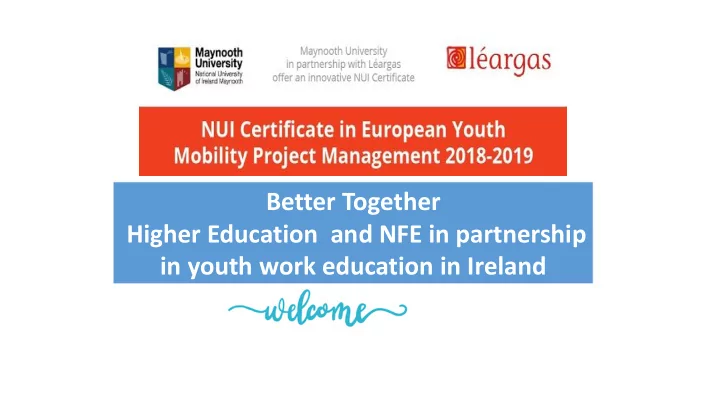

Better Together Higher Education and NFE in partnership in youth work education in Ireland
Department of Applied Social Studies Our mission: "To promote human rights, social justice and equality, nationally and internationally, through excellence and innovation in education, research and public engagement that contribute to the development of the social professions and applied social sciences ".
Origins of Irish Youth Work
Voluntary Principle key in Irish Youth Work Practice linked to concept of ‘subsidiarity’ Young people Adults Organisations
The Irish Youth Work ‘Sector’
Report on the Economic Value of Youth Work (NYCI, 2012)
Act to Plan - ‘ clear definition & direction’ Youth Work Act, 2001 NYDP 2003-2007
First full Gov. Department – DCYA 2011 Youth Affairs Unit • young people’s personal & social development • support effective youth work consolidate & enhance existing provision • monitor and assess quality of service & VFM • alignment - integration - coordinated services
Better Outcomes Brig ighter Futures (2014-20) National Policy Framework for Children and Young People Whole government policy, cross departmental responsibility designed to make Ireland “one of the best small countries to grow up in and raise a family”. (Taoiseach Enda Kenny, 2014) Framed around 5 Key Outcomes : 1. Active and Healthy 2. Achieving in all areas of learning/development 3. Safe and Protected from Harm 4. Economic Security and opportunity 5. Connected, Respected and Contributing
One of the principles underpinning the National Youth Strategy is that: ‘Professionals and volunteers working with young people are respected, valued and appropriately supported in their work’. (NYS, 2015:6)
Aim: • to develop youth practitioners’ knowledge, skills and competence in high -quality, mobility project management in the context of European programmes. The objectives of the programme are to ensure that students: • Have detailed knowledge of the national and European contexts of mobility projects • Understand the principles and practices that underpin European mobility projects • Can plan, organise and undertake a European mobility project
The Certificate is structured around the following themes: • The Certificate in European Youth Mobility consists of three modules as outlined below. • • Module 1: National and European Contexts [5 credits] • Module 2: Principles and Practice Skills [5 credits] • Module 3: Mobility Project Management [10 credits]
What does it it lo look lik like? 3 modules x 3 day residential each 1 study visit to Finland 1 week 5 assignments
Challenges of youth Self mobility awareness Project and personal management – effectiveness stages Organisational opportunities Assessing impact Youth Policy
What’s the difference between this programme and a training course?
Assignments (formative) • Organisation Study Visit European Youth Ka1 Application Learning Policy Essay European Form presentation Development Plan Reflective Journal
Evaluation • Mid way • End of programme • 6-12 months after the end of the programme
How did the students use their learning? “Since doing the course I feel like an expert” “Understanding policy, practice and implementation, and now I have broadened knowledge of theory – before it was hands practice and not much theory” “A clearer knowledge of how youth work strategies align with national and local strategies and how European work can assist in the delivery of local objectives”
How did the assignments support their learning? “Actually I think the highlight of the whole course in hindsight, was the terrible reflective essay. I really struggled with it, I really hated it and realise now why it was important and halfway through I really began to question myself”
How did the assignments support their learning? “ The last part of the programme was developing the EDP so that puts you in a different chair when your sitting down with the board and saying that’s what I think we should do…people are buying into it”
What did participants say • “ I found the academic parts of the course, the most helpful” • So, from talking to my manager, we’re going to make it part of everyone’s workplan – to do European work. This is all new…. So I’ll coordinate that and help people get through the admin side of things….it’s not just me in a corner doing it any more”
What did participants say “ Having done the course I wasn’t going to be doing things for the sake of doing things for the sake of it, I wanted to do projects that are going to further the organisation, there’s a big market for poor quality projects and we’re not interested”
What did their organisations say? “ Prior to the programme, I would have seen youth mobility as a bit of a luxury, now I see them as an opportunity” “We want to push ourselves to bring people with more complex organisational needs and go outside of our own comfort zone…we will see a higher impact”
What did their organisations say? “ We’re coming to the end of our strategic plan. European Youth Work will be in the next strategic plan” Case Studies….
Partnership (Estivall, 1994) 1. A period of time during which a process takes place moving from the idea of partnership transforming into a to structure which supports and enables partnership 2. A mechanism through which that process happens 3. A need and willingness to be involved and use outcomes 4. Involvement of different agencies/stakeholders 5. Internal and external discussions 6. There should be individual and collective benefits from participation.
Themes • Personal learning and organisational learning • Formal and non formal learning • Higher Education and Youth work sector • Recognition and/or accreditation
Sources and Resources Partners Organisational Websites Documents and Reports Leargas National Youth Work Development Plan (2003-07) https://www.leargas.ie/ Better Outcomes, Brighter Futures (2014) https://www.leargas.ie/news/leargas-and-maynooth- university-launch-new-nui-certificate-in-european-youth- National Youth Strategy (2015) mobility-project-management/ Department of Applied Social Studies Maynooth University https://www.maynoothuniversity.ie/applied-social- studies
Recommend
More recommend